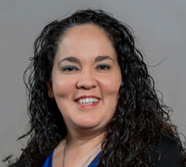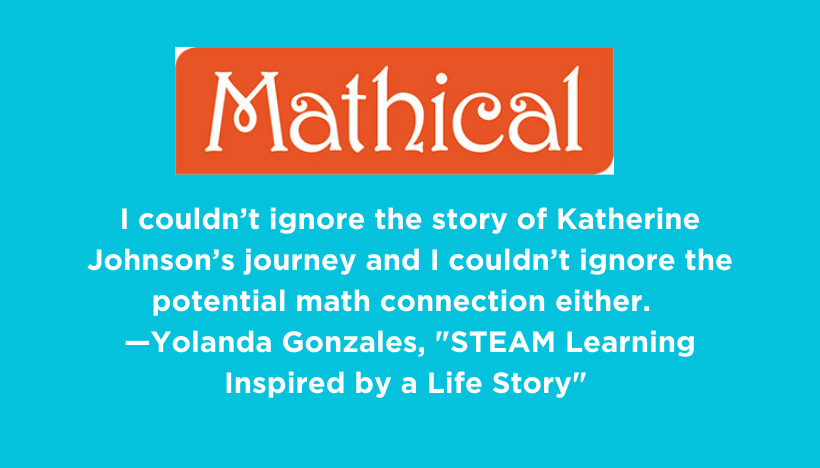This post was written by guest author Yolanda Gonzales.
The Mathical Book Award was new to me as an English language arts teacher and as an educator in general. Even though I teach in a STEAM-based school, it is still an ongoing struggle to create a cross-curricular study between the reading and math classes. Usually, our math and science teachers pair up to create a lesson and I pair up with social studies or technology.
But after viewing the Mathical award-winning author chats and read alouds that NCTE participated in as part of the National Math Festival in December of 2020, I see how beneficial and crucial it is to include areas of study that we wouldn’t traditionally think about in the reading classroom.
Ebony Joy Wilkins, the author of DK Life Series: Katherine Johnson, shared in her chat that she wants readers to be inspired by the story of famed NASA mathematician Katherine Johnson. Wilkins encourages both teachers and young learners to “face their fears, work diligently, and push for a fair place in this world.” Reading through the life story that she has provided in an engaging balance of graphics and text, I imagine the magnitude of the author’s goal as I think about how I would use this book in my own classroom.
When we engage in a book, whether it’s literary or informative text, I want my learners to demonstrate comprehension and analysis, but also to have an opportunity to apply what was read in some way. Katherine Johnson’s story gives us a perfect example of someone who had all the obstacles set up to cause her failure, but who did not let that stop her from doing what she loved and from helping others at the same time.
I couldn’t ignore the story of Katherine Johnson’s journey and I couldn’t ignore the potential math connection either. I handed over a copy of the book to our math teacher Matthew Botello, asking how we could have a math language arts activity with our students that went beyond writing a paragraph of how they solved a math problem. It’s been a struggle, I admit, especially with this year’s other challenges: we’ve been teaching in a hybrid model in which students in the classroom have had no or low-tech devices and students at home have had devices but were unable to meet at the same time; managing group activities with social distancing and not sharing supplies as often as we used to; and being confined to teaching in front of the computer instead of interacting with students all around the classroom.
Fortunately, brainstorming with my colleague gave me the running start I needed to create a Choice Board—a graphic organizer of project ideas that gives students options for exploring a topic in a variety of ways.
In this case, inspired by Katherine Johnson’s story, I decided to create a STEAM Choice Board; the math teacher provided the Math and Engineering sections and I created the rest—and my colleague and I experienced the most success we’ve ever had in formulating activities that include each other’s subject areas!
My thinking is that students can choose one project out of each section. Ideally the Choice Board will be used throughout the students’ classes—I plan to facilitate the Arts and Technology sections and the science, math, and engineering sections could be facilitated by those teachers as well.
It’s clear that Katherine Johnson’s story has appeal and value outside the areas of math and science. There are a multitude of connections you can make to other areas: social issues, the arts, passion projects, inquiry, mentoring, design and engineering—the list goes on. My hope is to illuminate the layers of Katherine Johnson’s challenges and contributions, so that students can be inspired to question, to push, and to do what they love well.
 Yolanda Gonzales teaches English language arts, grades 6–8, at the Joe Barnhart Academy in Beeville, Texas. Yolanda has a Bachelor of Science in Interdisciplinary Studies through A&M-Corpus Christi and a Master of Education in Curriculum and Instruction with a specialization in reading through Concordia University. She also currently serves on her school’s Campus Instructional Leadership Team. Yolanda aims to continually grow as a learner and as a professional, and is humbled and thrilled to be a part of NCTE. This will be her 14th year of teaching in the English Language Arts; she cannot wait to see what teaching will bring in another fourteen.
Yolanda Gonzales teaches English language arts, grades 6–8, at the Joe Barnhart Academy in Beeville, Texas. Yolanda has a Bachelor of Science in Interdisciplinary Studies through A&M-Corpus Christi and a Master of Education in Curriculum and Instruction with a specialization in reading through Concordia University. She also currently serves on her school’s Campus Instructional Leadership Team. Yolanda aims to continually grow as a learner and as a professional, and is humbled and thrilled to be a part of NCTE. This will be her 14th year of teaching in the English Language Arts; she cannot wait to see what teaching will bring in another fourteen.
It is the policy of NCTE in all publications, including the Literacy & NCTE blog, to provide a forum for the open discussion of ideas concerning the content and the teaching of English and the language arts. Publicity accorded to any particular point of view does not imply endorsement by the Executive Committee, the Board of Directors, the staff, or the membership at large, except in announcements of policy, where such endorsement is clearly specified.

